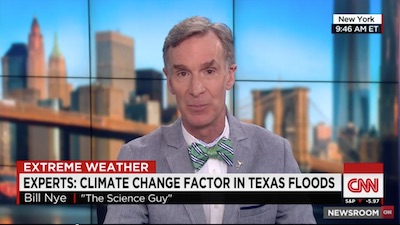Bill Nye, the not-so-good-science guy
Blog topic:

Bill "the science guy" Nye says that I am a denier.
First, what did he actually say? During his appearance on CNN, Bill Nye compared the link between denying a link between climate change and anthropogenic activity to denying a link between smoking and cancer:
“I just want to remind voters that suppose you had somebody running for congressional office in your district who insisted there was no connection between cigarette smoking and cancer. Would you vote for that person? You might, but if this person were adamant — ‘No, the scientists who studied cigarette smoking, they don’t know what…’ — if they were adamant, would you vote for them? And so, in the same way the connection between climate change and human activity is at least as strong as cigarettes and cancer. And so, I just want everybody to keep this in mind: that it’s very reasonable that the floods in Texas, the strengthening storms, especially — the president was in Florida — these things are a result of human activity making things worse. It’s very bad. I get this that people died in Texas, and I am reminding you what else. This is a very expensive business. When you flood the fourth largest city in the United States, somebody is going to pay for it, and it’s you and me. And so, the sooner we get to work on climate change, the better.”
Here’s the actual video:
These short comments and comparison he made are inappropriate for several major reasons.
To begin with, he follows the usual alarmist assertion that every calamity is necessarily due to global warming (now known as “climate change” so that they can cover more ground) and that all the climate change is necessarily anthropogenic. Since bizarre weather patterns can happen all the time with some probability, and since part of the climate change is also natural, these implicit “logical” steps would not make sense, at least in any other scientific discipline. I won’t dwell on this since others already did.
Second, the global warming debate is mostly a quantitative one. While the IPCC claims that climate sensitivity can be very large (e.g., a 4.5°C increase per CO2 doubling which would be catastrophic), I claim that such high values are ruled as they are inconsistent with a lot of empirical data (e.g., see this). In other words, skeptics like myself don’t argue that CO2 has no effect on climate, only that the IPCC story is highly exaggerated. On the other hand, whether smoking contributes 90% or 10% of the cases of lung cancer would be good enough reason for any rational person to quit smoking (well, rational and able to overcome his or her addiction). On the other hand, if a given emission scenario over the 21st century will cause a 1°C or 4°C could make a huge difference. This means that denying that smoking causes cancer is a yes/no question while most skeptics don’t “deny anthropogenic global warming”, instead, they only claim it is minor.
The third point is the main one I want to make. The reasoning behind the attribution of lung cancer to smoke and behind attributing global warming to anthropogenic activity is conceptually different, so different, that putting both on the same pedestal is simply wrong. The evidence linking lung cancer to smoking is in the form highly statistically significant increase in the incidence rate of lung cancer when comparing smoking to non-smoking groups. So, either smoking or something very closely related to it is clearly carcinogenic. The assertion that climate sensitivity is large, that most of the 20th century warming is necessarily anthropogenic and that temperature increase over the 21st century will be large are the result of model predictions, not on empirical evidence. In fact, empirical evidence such as the small response to volcanic eruptions (e.g., Lindzen and Giannitsis 1998, see also note on climate effects of volcanoes here), or the lack of correlation between the order of magnitude CO2 variations over geological time scales and the global temperature (e.g., this discussion on cosmic rays and climate), or of course, the lack of warming over the past nearly two decades, counter to all the model predictions (e.g., see this discussion of the hiatus long before the term was used).
If we use the cancer analogy it would be as if we had a model that can predict, at the biochemical level that some of the chemicals in cigarettes are carcinogenic, and that smoking should cause cancer, but, while the model would say that the incidence rate should be high and should explain most of the lung cancer cases, comparing the actual incidence rate would show that only some modest fraction of the lung cancer cases are attributed to smoking, but the rest are not. Yet, even with the evidence showing only a small difference in the incidence rate between the smoker and non-smoker group, the model will still be believed and it would be used to make predictions to other types of cancers, e.g., saying that they happen at a huge rate while they don’t. Sounds ridiculous? Well, this is what’s happening in climate science.
Anyway, the last time I had any thought about the “science guy”, was when I heard he was to give the commencement speech at my wife’s graduation from Caltech (roughly when the global warming hiatus began!). Back then I thought of how uninspiring it is. I am not saying that publicizing science to the public is not important (which is what Bill Nye did so well), but I didn’t think that this is the kind of figure that will push the young cadet of scientists and engineers into new frontiers. Its isn’t as if he is doing rocket science. In retrospect, I now think it was even less appropriate to have him.
